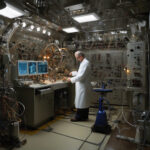Turning Waste into Power: UK’s Innovative Approach to Nuclear Reactor Graphite
The University of Manchester has been awarded a grant for a program to change the landscape of nuclear energy production in the UK. This groundbreaking initiative focuses on developing nuclear reactor graphite from recycled materials, aiming to significantly reduce waste and environmental impact while enhancing the sustainability of nuclear power generation.
Graphite plays a crucial role in moderating the nuclear fission process within reactors, ensuring safe and efficient energy production. Traditionally, graphite components have been manufactured from virgin materials, leading to substantial waste generation and resource depletion. By shifting towards using recycled graphite, the UK not only addresses the issue of waste management but also promotes a circular economy model that maximizes resource utilization and minimizes environmental harm.
The project led by the University of Manchester underscores the importance of innovation and sustainability in the nuclear energy sector. By harnessing recycled materials to produce reactor graphite, the UK sets a precedent for other countries to follow suit in adopting eco-friendly practices within the nuclear industry. This initiative showcases the potential for technological advancements to drive positive change and pave the way for a greener future.
Moreover, the program aligns with the UK government’s ambitious targets to achieve net-zero carbon emissions by 2050. By investing in research and development projects that prioritize sustainability and waste reduction, the UK demonstrates its commitment to combating climate change and transitioning towards cleaner energy sources. The utilization of recycled graphite in nuclear reactors not only contributes to lowering carbon footprints but also highlights the importance of resource efficiency in meeting environmental goals.
In addition to its environmental benefits, the use of recycled graphite offers economic advantages by reducing production costs and reliance on primary raw materials. By closing the loop on graphite utilization and establishing a circular supply chain, the UK strengthens its position as a leader in sustainable energy practices. This approach not only enhances the resilience of the nuclear energy sector but also fosters innovation and competitiveness in the global market.
The University of Manchester’s pioneering research in developing nuclear reactor graphite from recycled materials exemplifies a forward-thinking mindset that prioritizes sustainability and efficiency. By leveraging cutting-edge technologies and collaborative partnerships, the UK propels its nuclear industry towards a more sustainable and environmentally conscious future. Through initiatives like these, the UK showcases its dedication to driving positive change and shaping a greener, more sustainable world for generations to come.
In conclusion, the UK’s plans to produce nuclear reactor graphite from recycled materials mark a significant step towards achieving a more sustainable and efficient energy sector. By embracing innovation, sustainability, and circular economy principles, the UK sets a precedent for responsible resource management within the nuclear industry. This initiative not only reduces waste and environmental impact but also reinforces the UK’s commitment to combating climate change and building a cleaner, brighter future.
nuclearreactor, graphite, recycledmaterials, sustainability, UKenergytransition












